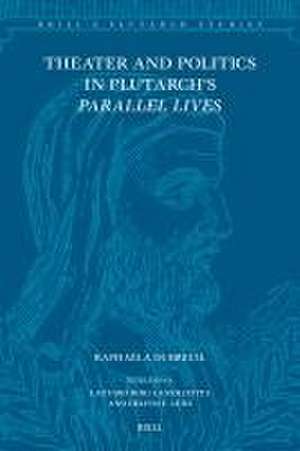Theater and Politics in Plutarch’s <i>Parallel Lives</i>: Brill's Plutarch Studies, cartea 13
Autor Raphaëla Dubreuilen Limba Engleză Hardback – 8 noi 2023
Preț: 651.61 lei
Preț vechi: 794.65 lei
-18% Nou
Puncte Express: 977
Preț estimativ în valută:
124.68€ • 130.53$ • 103.17£
124.68€ • 130.53$ • 103.17£
Carte indisponibilă temporar
Doresc să fiu notificat când acest titlu va fi disponibil:
Se trimite...
Preluare comenzi: 021 569.72.76
Specificații
ISBN-13: 9789004681736
ISBN-10: 9004681736
Dimensiuni: 155 x 235 mm
Greutate: 0.56 kg
Editura: Brill
Colecția Brill
Seria Brill's Plutarch Studies
ISBN-10: 9004681736
Dimensiuni: 155 x 235 mm
Greutate: 0.56 kg
Editura: Brill
Colecția Brill
Seria Brill's Plutarch Studies
Notă biografică
Raphaëla Dubreuil, Ph.D. (2017), University of Edinburgh, publishes on different aspects of Imperial Greek literature, including forthcoming articles on Dio Chrysostom. She is a recipient of an IRC fellowship (Trinity College Dublin) and a DAAD (the Freie Universität zu Berlin).
Cuprins
Acknowledgements Ix
Introduction: Plutarch, Theater and Politics
0.1 Plutarch of Chaeronea
0.2 The Theatrical in the Parallel Lives
0.3 Demetrius–Antony
0.4 The Political Plutarch
0.5 Plutarchan Exceptionalism?
0.6 Readers, Theaters, and Cultures
0.7 The Scope of This Book
1 Demosthenes: Between Oratory and Acting
1.1 Voice, Delivery, and Morality
1.2 The Triumph of Oratory over Theater
2 Phocion: Democracy in the Theater
2.1 The Theater as Locus for the Statesman’s Virtue
2.2 Choregoi and Civic Values
2.3 Condemned in the Theater
3 Sparta: Performance in Foreign and Domestic Politics
3.1 Greek Theater and Spartan Victory in Agesilaus, Cleomenes, and Lysander
3.2 Poetry and Poets at Sparta
3.3 Lysander’s Revolutionary Theater
4 Roman Warfare: Violence and Conflict as Spectacle
4.1 Roman Spectacle of War
4.2 Triumph in Aemilius Paullus
5 Roman Politics: Sponsors and Audiences
5.1 Roman and Greek Statesmen in the Theater
5.2 Seating in the Theater
5.3 Theatrical Sponsorship and Political Character
6 Cicero: Roman Orator on Display
6.1 Roscius the Comedian and Aesopus the Tragedian
6.2 Cicero Contra Antony: Competing Models of Emotional Politics
6.3 Cicero’s Demise
Conclusion
7.1 Athens, Sparta, and Rome
7.2 The Theater as Destruction and as Reparation
7.3 Plutarch, Dio, and the Alexandrians
Bibliography
Index Rerum et Nominum
Index Locorum
Introduction: Plutarch, Theater and Politics
0.1 Plutarch of Chaeronea
0.2 The Theatrical in the Parallel Lives
0.3 Demetrius–Antony
0.4 The Political Plutarch
0.5 Plutarchan Exceptionalism?
0.6 Readers, Theaters, and Cultures
0.7 The Scope of This Book
1 Demosthenes: Between Oratory and Acting
1.1 Voice, Delivery, and Morality
1.2 The Triumph of Oratory over Theater
2 Phocion: Democracy in the Theater
2.1 The Theater as Locus for the Statesman’s Virtue
2.2 Choregoi and Civic Values
2.3 Condemned in the Theater
3 Sparta: Performance in Foreign and Domestic Politics
3.1 Greek Theater and Spartan Victory in Agesilaus, Cleomenes, and Lysander
3.2 Poetry and Poets at Sparta
3.3 Lysander’s Revolutionary Theater
4 Roman Warfare: Violence and Conflict as Spectacle
4.1 Roman Spectacle of War
4.2 Triumph in Aemilius Paullus
5 Roman Politics: Sponsors and Audiences
5.1 Roman and Greek Statesmen in the Theater
5.2 Seating in the Theater
5.3 Theatrical Sponsorship and Political Character
6 Cicero: Roman Orator on Display
6.1 Roscius the Comedian and Aesopus the Tragedian
6.2 Cicero Contra Antony: Competing Models of Emotional Politics
6.3 Cicero’s Demise
Conclusion
7.1 Athens, Sparta, and Rome
7.2 The Theater as Destruction and as Reparation
7.3 Plutarch, Dio, and the Alexandrians
Bibliography
Index Rerum et Nominum
Index Locorum











